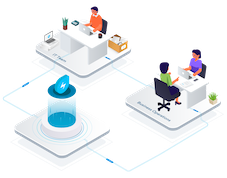
Service Desk: definition, functions and advantages
The Service Desk is a fundamental component in the management of IT services within an organization. In this article, we will explore in detail what a Service Desk is, what its definition is, how it works, and what it does. We will also discover its advantages and how to choose the right Service Desk for your business needs.
What is the Service Desk?
The Service Desk, also known as “assistance service” O “support center“, is an infrastructure dedicated to managing requests, problem reports and the need for technical assistance within a company. It is the main point of contact between users and the IT department, playing a crucial role in efficient management of IT services.
Definition of Service Desk
The definition of a Service Desk may vary slightly from company to company, but in general, it is one structure that offers a single point of access for users needing technical support. This support may concern hardware issues, software issues, service requests, or questions regarding your company’s IT resources. The Service Desk takes care of
- to record,
- classify,
- manage,
- solve
these requests promptly.





